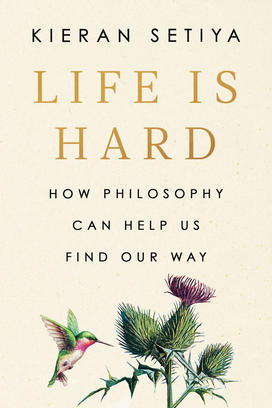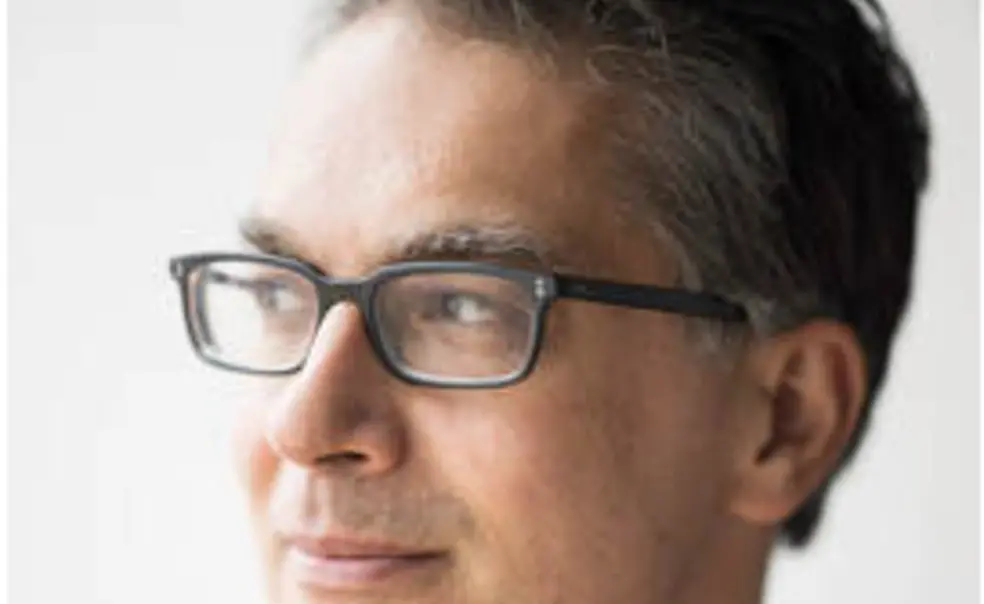Kieran Setiya *02 Offers a Handbook on Navigating Hardships
The book: In Life is Hard (Riverhead Books), Kieran Setiya *02 offers readers a map to navigating life’s difficulties. Using a mix of personal reflection, philosophical principles, and various forms of media, he shows how the tools of philosophy can be helpful to find our way. Through wit and humor, Setiya gently walks readers through common challenges — from grief and ill health to loneliness and failure — to insightfully argue that hard times are necessary to experience the full beauty of life and offer tips on how to make it through.

The author: Kieran Setiya *02 is a philosophy professor at the Massachusetts Institute of Technology. He focuses on ethics, epistemology, and the philosophy of the mind. Setiya earned his bachelor’s and Ph.D. in philosophy from Jesus College in the University of Cambridge and Princeton. He has written on a variety of philosophical topics and is the author of several books including Midlife and Practical Knowledge.
Excerpt:
Life, friends, is hard—and we must say so. It’s harder for some than it is for others. Into each life some rain must fall, but while the lucky dry themselves beside the fire, others are drenched by storms and floods, both literal and figurative. We live in the wake of a global pandemic and mass unemployment, amid the surging catastrophe of climate change and the revival of fascism. These calamities will disproportionately harm the poor, the vulnerable, and the oppressed.
My own luck has been good. I was raised in Hull, an industrial city in the northeast of England that had been through better times. My childhood had its share of troubles, but I fell in love with philosophy, made my way to Cambridge as an undergraduate, moved to the U.S. for graduate school, and stayed. I’m a professor of philosophy at MIT, protected by the wealth and stability of an illustrious if eccentric institution. I have a house, a happy marriage, and a child who is wiser and braver than I ever was. I have never gone hungry or been homeless; I am not a victim of brutality or war. But no one is shielded, in the end, from sickness, loneliness, failure, grief.
Since the age of twenty-seven, I have experienced chronic pain: persistent, fluctuating, strange, a constant drone of sensory distraction. It can be difficult to concentrate and, at times, impossible to sleep. Because it is invisible, my condition is isolating: almost no one knows. (I’ll tell you all about it in Chapter 1.) At thirty-five, I had a premature midlife crisis. Life seemed repetitive, empty, just more of the same: a sequence of accomplishments and failures stretching through the future to decline and death. Eight years ago, my mother was diagnosed with early-onset Alzheimer’s. Her memory faltered for some time, and then abruptly crashed. I am grieving for someone who is still alive.
As I look around me, I see suffering on a massive scale. When I wrote these words, millions were living in enforced isolation, lonely and desperate due to Covid-19. Many had lost their jobs or could not pay their bills. Loved ones were sick or dying; there was an epidemic of grief. Inequality was rampant and democracy fragile. Another storm is coming, as we fail to heed the fire alarm of global warming.
So what are we to do?
There is no cure for the human condition. But after twenty years teaching and studying moral philosophy, I believe that it can help. This book explains how.
Despite its name, “moral philosophy” is about much more than moral obligation. As Plato wrote in the Republic, circa 375 BCE, “The argument concerns no ordinary topic but the way we ought to live.” The subject of moral philosophy is expansive, addressed to everything that matters in life. Philosophers ask what is good for us, what ambitions we should nurse, what virtues we should cultivate or admire. They give guidance and they give arguments; they formulate theories by which to live. There’s an academic side to this: philosophers study abstract questions and dispute each other’s views; they trade in thought experiments that make the familiar strange. Through much of history, there was no clear distinction between philosophical ethics and “self-help.” It was assumed that philosophical reflection on how to live should make our own lives better.
I accept every part of that. But the aspiration to live well has frequently embraced a more quixotic goal: the best or ideal life. In Plato’s Republic, justice is imagined through a utopian city-state, not as a fight against injustice here and now. In the Nicomachean Ethics, Plato’s student Aristotle aims for the highest good, eudaimonia—a life that is not merely good enough but one you should choose if you could choose any life at all. Aristotle thought that we should imitate the gods: “We must not follow those who advise us, being men, to think of human things, and, being mortal, of mortal things, but must, so far as we can, make ourselves immortal, and strain every nerve to live in accordance with the best thing in us.” His answer to the question how to live is a vision of life without deficiency or human need: if you like, it’s his version of heaven.
With rare exceptions, even those who set their sights a little lower tend to theorize the good life, not the bad. They focus on pleasure, not pain; love, not loss; achievement, not failure. Not long ago, the philosopher Shelly Kagan coined the term “ill-being” for “the elements that directly constitute a life’s going badly.” In “typical discussions of well-being,” he observed, “ill-being is largely neglected.” There’s an affinity here with the “power of positive thinking” that implores us not to dwell on trials and tribulations but to dream of the life we want. Even the ancient Stoics—philosophers explicitly concerned with how to weather life’s adversities—were surprisingly upbeat. They believed that we can flourish whatever our circumstance; well-being is entirely up to us. In each of these conceptions, hardship is repressed as we pursue the good.
A premise of this book is that this whole approach is wrong. We should not turn away from hardship; and the best is often out of reach. Striving for it only brings dismay.
This attitude may strike you as perverse or pessimistic. But we need not live our “best lives” in order to be more resilient; and we have to face the facts. Here’s an experience you may have had: You tell a friend about a problem you are coping with, maybe a blowup at work or in a close relationship, a health scare that has you rattled. They are quick to reassure you—“Don’t worry; it will all be fine!”—or to offer you advice. But their response is not consoling. Instead, it feels like disavowal: a refusal to acknowledge what you’re going through. What we learn in moments like these is that assurance and advice can operate as denial.
Worse than denial, even, is the urge to justify human suffering. “Everything happens for a reason”—except, of course, it doesn’t. Philosophers have a word, “theodicy,” for an argument that vindicates the ways of God to man. Theodicies address the problem of evil: if God is omnipotent and benevolent, what accounts for the manifold evils of the world? But theodicy has a life of its own, outside of narrowly theistic or doctrinal contexts. Religious or not, we conjure the problem of evil whenever we protest that something should not be; and we engage in something like theodicy when we say it’s for the best.
The problem with theodicy is not just intellectual—none of the arguments work—but ethical, too. It’s wrong to justify your own or others’ suffering, to mute pity or protest in that way. That is the moral of the most famous theodicy of them all. In the Book of Job, the Accusing Angel urges God to test a “man of perfect integrity,” killing his sons and daughters, destroying his property, covering his skin with boils “from his scalp to the soles of his feet,” so that he is left scratching himself with a shard of pottery in the dust. Job’s friends insist that he must deserve his fate, a punishment for some cryptic sin. God condemns them “because [they] have not spoken the truth about me.” Meanwhile, Job protests his innocence. Though the book concludes with what might seem to be redemption—God returns Job’s possessions twice over, “fourteen thousand sheep, six thousand camels, a thousand yoke of oxen, and a thousand donkeys,” along with seven brand-new sons and three new daughters— the theodicy falls flat. It’s a travesty to think replacements could atone for the loss of Job’s first children.
What we should take from the Book of Job is not that virtue is rewarded in the end but that Job’s friends were wrong to make excuses for his misery and that it was Job who spoke the truth: we don’t deserve to suffer as we do. I’m not saying there is no God, though I don’t believe in one myself. I am saying that if God’s existence can be squared with the persistence and pervasiveness of hardship in human life, the reconciliation should not temper or negate the fury of compassion, for ourselves and others.
So this is where we are: heirs to a tradition that urges us to focus on the best in life but painfully aware of the ways in which life is hard. To open our eyes is to come face-to-face with suffering—with infirmity, loneliness, grief, failure, injustice, absurdity. We should not blink; instead, we should look closer. What we need in our affliction is acknowledgment.
Excerpted from Life is Hard by Kieran Setiya. Used by permission of the publisher Riverhead Books. All rights reserved.
Reviews
“Life may be hard, but Kieran Setiya shows us better ways to think about it and how, despite everything, that can give us hope.” — Katherine May, author of Wintering
“Kieran Setiya argues that certain bracing challenges—loneliness, failure, ill health, grief, and so on—are essentially unavoidable. . . . But it’s good, the book shows, to acknowledge hard experiences and ask how they’ve helped us grow tougher, kinder, and wiser.” —The New Yorker












No responses yet